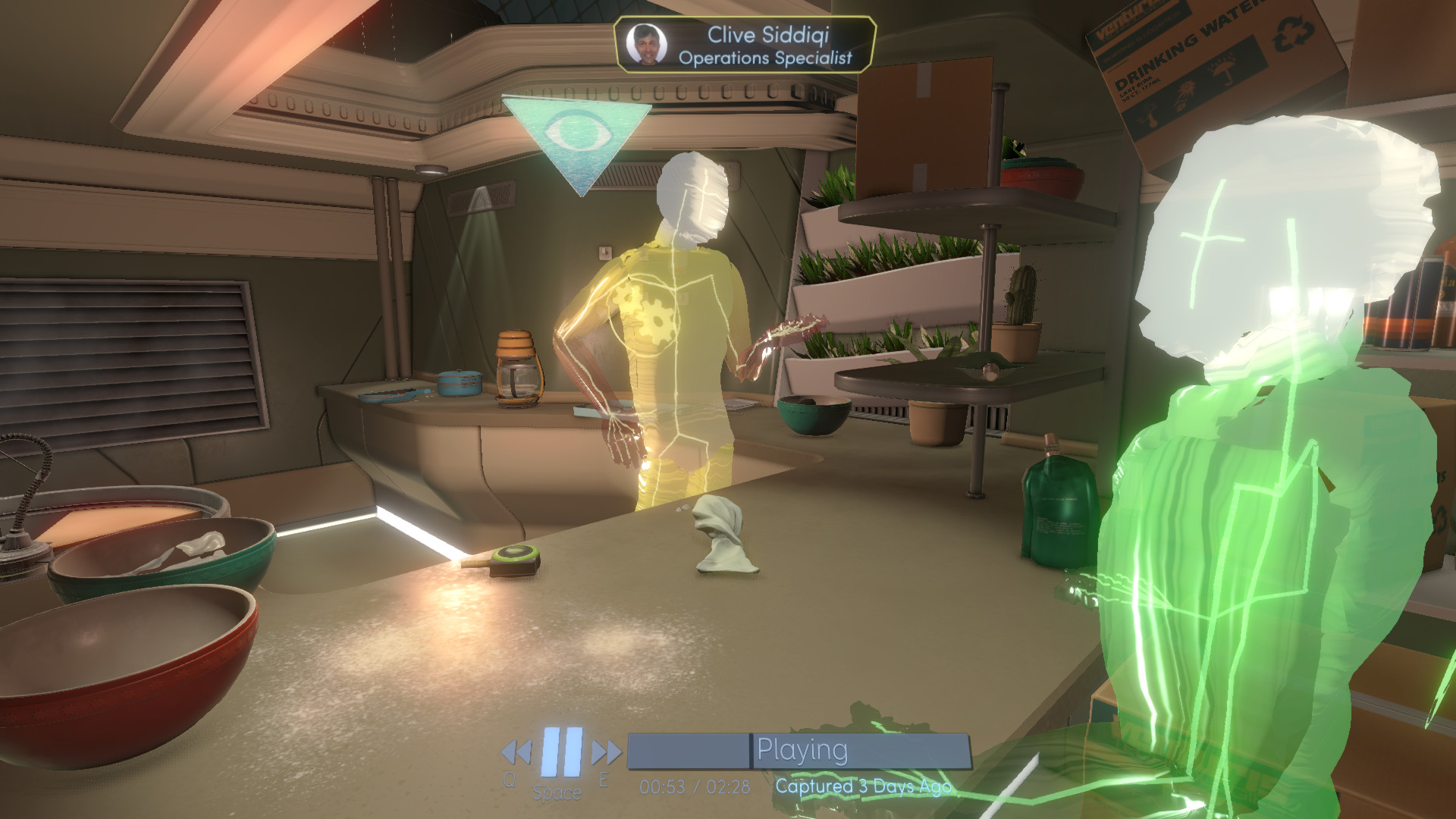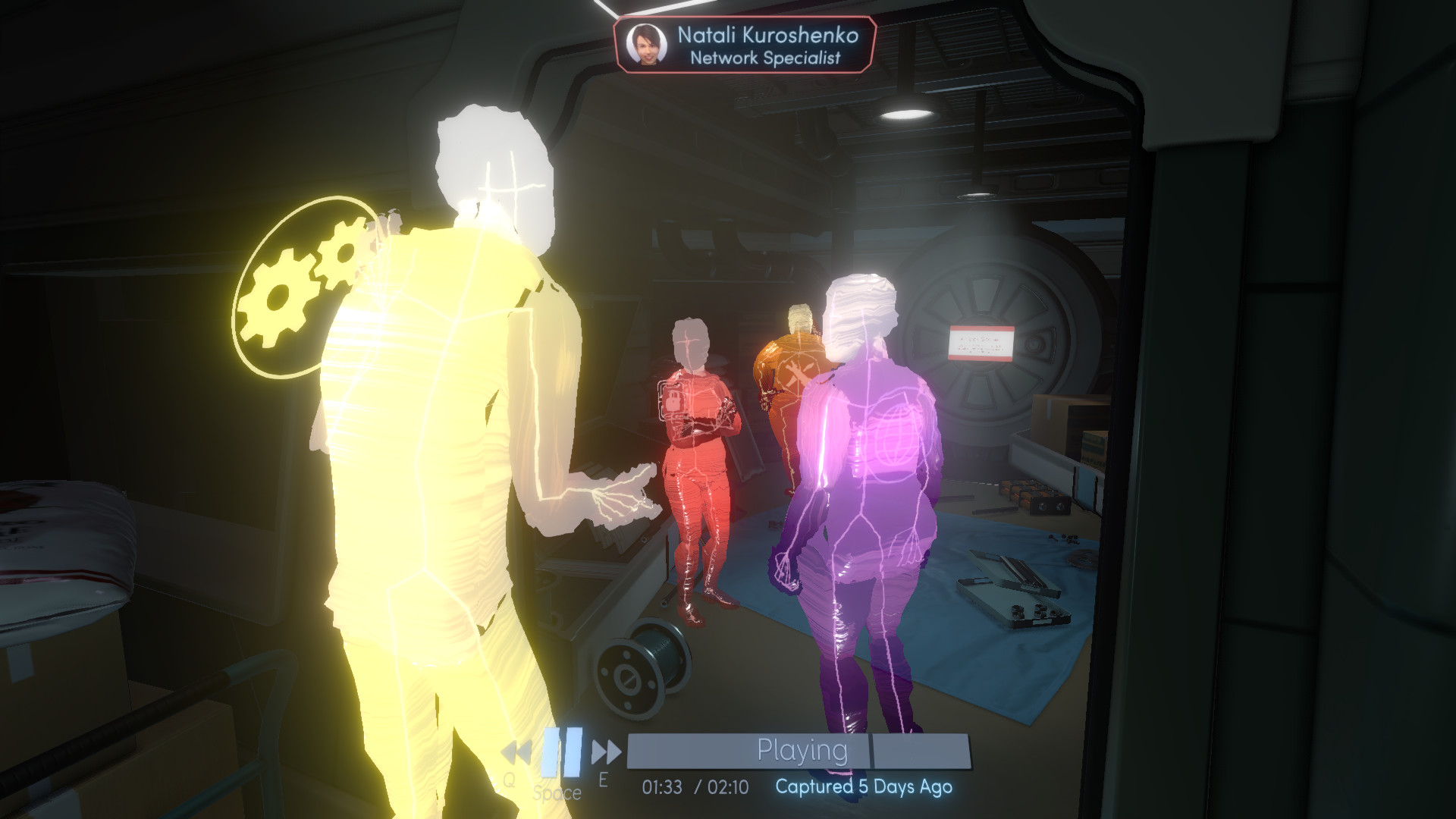Tacoma opens with an empty space station; deserted by its crew in mysterious circumstances. Yet it doesn’t feel isolated. Protagonist Amy rarely speaks, but regularly receives messages from her corporate handlers and AI companion, and is constantly immersed in the colourful imprints of the ship’s previous inhabitants.
The game is often tense, and sometimes things seem bleak, but there’s an underlying current of perseverance and optimism. And in times like these that are often tense and sometimes bleak, that’s important.
[This article contains full spoilers for Tacoma, a game well worth playing unspoiled.]

Tacoma’s world is a fascinating one; a complex weaving of the utopic and dystopic. The crew of the eponymous spacecraft are of different races, nationalities, sexualities, and genders. Their identities have no apparent bearing on their work or day to day lives. Yet in this world where bigotry is seemingly eliminated, economic oppression looms large.
This is a very clever way of integrating real world problems into a narrative without it being directly at the expense of the marginalised. It gives the sense that, in a future where artificial intelligence and space tourism are widespread, social progress is also possible – though evidently incredibly imperfect.
Moreover, and crucially Tacoma tells us that where injustices occur, they can be overcome with dedicated teamwork from a diverse group.
Soon after the catastrophe that leaves Tacoma without an air filter, Sareh, the ship’s doctor, splits off from the group. Disengaging from a space in which she has to remain calm and professional, she begins to have a panic attack. ODIN, the artificial intelligence, gently guides her through visualisations and affirmations designed to bring her out of it.
For me – a woman with an anxiety disorder – this was a complex moment. On one hand, this was an accurate and respectful depiction of an often trivialised mental illness. On the other, panic was an appropriate response to Sareh’s situation, stranded in space with a dwindling oxygen supply. This is often not the case with anxiety attacks (and seems to track in Sareh’s case since she and ODIN have clearly worked through their calming script many times before, presumably including when she wasn’t truly in imminent danger).
And yet, against all odds, in the end it seems that Sareh didn’t need to panic.
To quote Chelsea Manning, #WeGotThis
Despite discovering that their employers deliberately sabotaged them in an attempt to create a tragedy to push through legislation favourable to their corporate interests, every member of Tacoma’s crew escapes safely. They not only live, but foil this plot that would have had widespread negative implications.

Nat, whom Sareh gave a less than 1-in-5 chance to survive the necessary cryofreeze due to a heart problem, survives fine. The game doesn’t attempt to make a convoluted explanation, she just beat the odds. (This is particularly important considering she is in a prominent same gender relationship, subverting the bury your gays trope.) Given the severity of the information they uncovered, they’re not in danger of corporate backlash – rather it’s the corporation that’s in trouble. Hell, even the station cat can be seen safe and sound, sleeping in a crewmember’s arms as they ready to board their rescue ship.
It seems to the very end that ODIN, who you’ve been sent to retrieve, might be the only character to come out of this badly – until you discover that you’ve been playing as a member of an AI rights group who has come to give him his freedom. In other words, your mission all along was to help the one member of the crew who is specifically discriminated against for his identity. You’re a hero.
The game’s ending is almost unequivocally a happy one. And how rare is that? Hopeful conclusions, especially for a diverse cast, are incredibly few and far between. That Tacoma decisively breaks this tradition is so, so refreshing. The message that, actually, people of all kinds can end up okay, even in deeply oppressive situations, is as beautiful as it is rare.
In short, Tacoma shows a world deeply flawed and says: maybe there’s no need to panic. And that’s something I needed to hear.
Jay Castello
Latest posts by Jay Castello (see all)
- Assassin’s Creed: Origin’s Discovery Tour Mode is Great - February 23, 2018
- Celeste’s Assist Mode Brings Welcome Accessibility Options - January 25, 2018
- Overwatch Finally Sent Me A Notification About an Abuse Report - January 12, 2018
